Bovine TB: Young farmer in tears after TB hits 55 cows
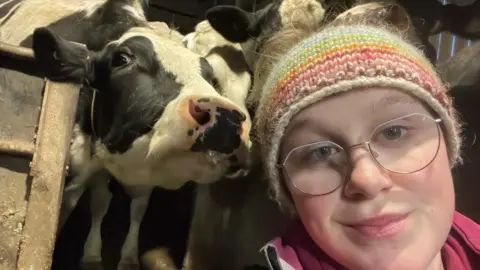 BBC
BBCA young dairy farmer has spoken about her family being left in tears after a major outbreak of bovine TB.
Mary Raymond said loading the 55 infected cows onto a lorry to be killed was "the worst thing I've ever done".
It comes as the Welsh government unveiled a new strategy for tackling the disease over the next five years.
Two new taskforces are to be set up, with the aim of eradicating bovine TB in Wales by 2041.
Ms Raymond, 20, said her family farm near Croesgoch in Pembrokeshire has been battling the disease for more than three-and-a-half years.
"We had 55 cows test positive altogether," she said. "I came home [from university] for the weekend because I wanted to be with mum and dad because it's a horrible thing to go through."
"Afterwards we all sort of went our separate ways on the farm and had 10 minutes to ourselves, a moment to cry," she said.
"All of us did because it was so emotional and draining".
"Everyone has put so much time and effort into raising those cows from calf and then you're with them for their whole life - you feed them, you milk them, you calve them," she said.
"Then all of that just seems like a waste because nothing comes of it."
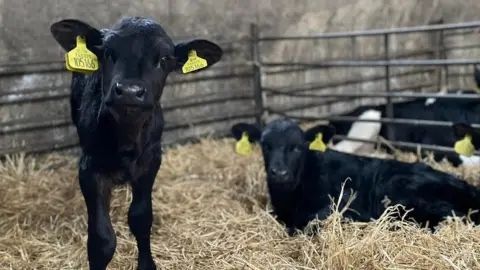
She explained that most of the neighbouring farms were also affected, with Pembrokeshire classed as an area of high prevalence for the disease.
Farms that have been hit face strict restrictions, with cows testing positive taken away and killed.
She urged the Welsh government to work more closely with farmers on measures to combat TB.
"If they listened to what Welsh farmers want maybe there wouldn't be such negativity surrounding the relationship between government and farmers on TB," she said.
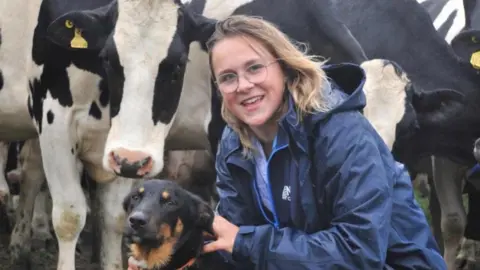
The Welsh government said its TB eradication programme was making "good progress".
Between 2009 and December 2022, new TB incidents fell by 49% in Welsh herds while prevalence decreased by 32%.
At the end of December 2022, 94.7% of herds were TB free.
But 9,516 cattle were still slaughtered as a result of the disease last year.
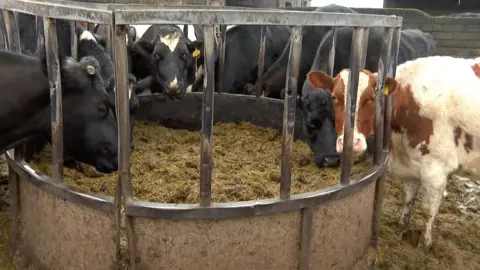
A new five-year plan for tackling the disease was launched in the Senedd by rural affairs minister Lesley Griffiths following a public consultation.
It includes a commitment to set up two new taskforces - a publicly appointed programme delivery board and technical advisory board on TB.
These will be made up of people with expertise in the area, from farming and wildlife organisations to vets and academics.
Their role will be to challenge and provide advice to the chief veterinary officer for Wales and the Welsh government on reaching its 2041 goal.
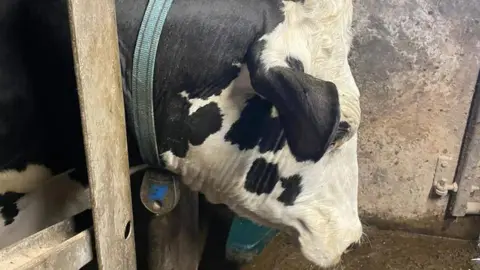
One of the technical advisory board's first tasks will be to review the practice of slaughtering pregnant cows infected with TB on farm, following warnings from many in the industry about the mental toll this is taking on farmers.
A specific project is to be launched focusing on Pembrokeshire, working with local farmers and vets to try and drive down numbers of infected herds there.
TB-free Wales
Ministers also want to see Welsh farms getting involved in trials for a new cattle vaccine against TB, which are currently underway in England and have been described as a potential "game changer".
Ms Griffiths said: "Good progress has already been made, with the long-term trends showing a decrease in cases.
"However, government cannot do this alone. Partnership working is needed with our farmers and vets to reach our goal of a TB-free Wales."
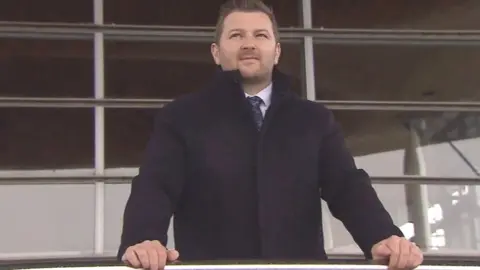
Sam Kurtz, who speaks for the Welsh Conservatives on rural matters, said TB would only be removed from herds by everyone "collaborating and working as one".
"For too long our industry had been left with little hope of ever seeing TB eradicated in Wales," he said.
"We need the government to work with the industry to give the industry that all important hope, and all of us to work together."
The Welsh government continues to rule out badger culling, despite calls from farming unions, and says it will push ahead with badger vaccination projects.
These will include a programme on Holy Island off Anglesey, with the potential to extend across Anglesey.
Plaid Cymru agriculture spokesman Mabon ap Gwynfor told the minister it was "foolish to disregard culling" of badgers in areas where TB was present.
"Badger culling, therefore, has to be part of the solution," he said.
"Until we see the vaccine [for cattle], and in view of the scientific evidence that culling is an important tool in areas where infection exists, will the minister allow a controlled culling programme in those areas?"
Ms Griffiths said she had "consistently ruled out an English-style widescale cull".
